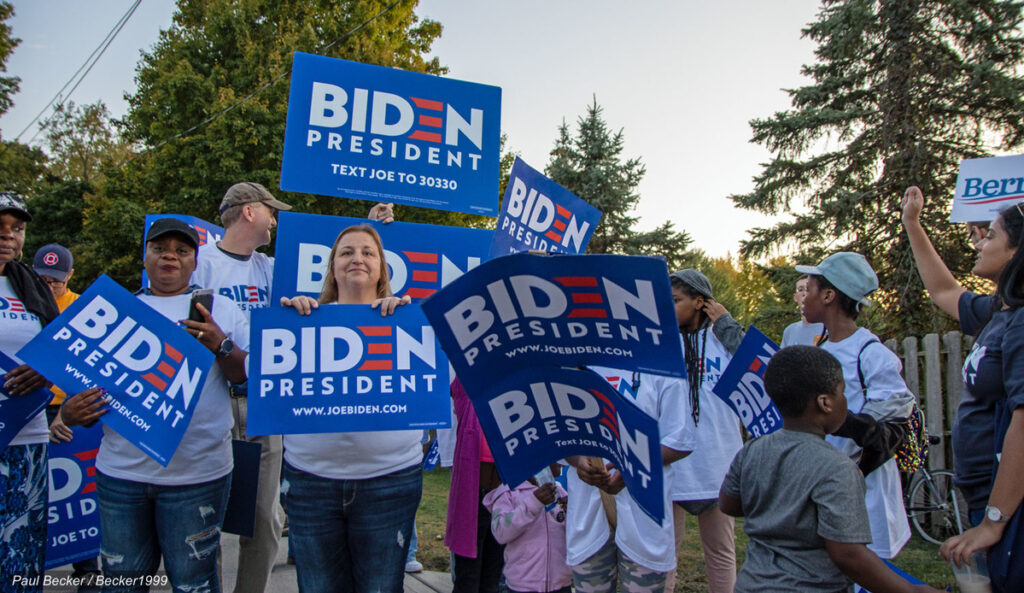By: Krishni Satchi, Lauren Schulsohn
As the upcoming U.S. presidential election nears, the government’s coronavirus response has become a key voter issue. President Donald Trump’s pandemic response has been widely regarded as a failure, with national leaders and public figures on the international stage condemning his initial denial of the virus and his prioritization of the short-term success of the economy over keeping his citizens safe.
According to the latest NPR poll, over half of Americans disapprove of Trump’s handling of the coronavirus crisis, signalling that this may be a large factor in determining the outcome of the 2020 election. In a move to take advantage of widespread frustration with the President, presidential candidate former Vice President Joe Biden has unveiled an extensive pandemic response plan, emphasized his prior experience in the press and gone on to attack Trump on the campaign trail and during the first presidential debate.
Biden has continually used harsh rhetoric to signal his general frustration with the Trump pandemic response. In a September 17 town hall, Biden called on Trump to step down due to his failure to prevent the high death count and admonished his poor communication, stating that “what presidents say matter [because]people listen.” The Democratic presidential candidate is expected to continue these coronavirus-related attacks through the rest of the campaign.
While Trump has put economic prosperity and promises of reopening at the center of his re-election campaign, Biden makes the case that the current recession is a direct result of Trump’s inability to manage the pandemic in the early stages. In contrast with other developed countries, Trump refused to stockpile personal protective equipment and prioritize increased testing during the early stages. As stated by Dr. Anthoni Fauci, a key leadership figure within the U.S. Coronavirus Task Force and the director of the National Institute of Allergy and Infectious Diseases, this delay was a huge “failing” of the administration. Meanwhile, a centerpiece of Biden’s plan is the “Pandemic Testing Board,” composed of public and private stakeholders working to increase production and distribution of tests.
In March, Trump invoked the Defense Protection Act in order to push General Motors to produce ventilators amidst public pressure to prepare the country for the worst effects of the virus. Albeit a step in the right direction, critics say that he has not used the act in its totality in the months since and has failed to create a consistent chain of production for vital equipment. Biden has criticized Trump for this misstep throughout the pandemic and states on his campaign website that he will use the act to ramp up production of personal protective equipment.
Trump’s efforts to seem in control of the pandemic have led to inaccurate assertions by himself and his administration. In a press briefing on September 16, Trump assured the general public that a vaccine would soon be available and that “the mask is not as important as the vaccine.” This was a direct contradiction of conclusions reached by several public health officials, including Dr. Redfield, the director of the Centers for Disease Control and Prevention. Trump also received backlash in March for prematurely presenting hydroxychloroquine as a treatment, a statement which notably led to the death of a man from Arizona after he ingested a nonmedicinal version of the drug.
Biden’s plan, in contrast, places public health officials at the forefront of communication and decision making. This method was praised by a former senior advisor to President Obama, who said that it is “not only good policy but good politics” that Biden seems reliant on scientific consensus regarding proposals that include a nationwide shutdown and a national mask mandate.
Other key aspects of Biden’s proposed pandemic response plan include his pledges to push the National Institute of Health to work closely with the Food and Drug Administration in vaccine development, as well as his desire to reinstate a White House Council on global health security. This council was dismantled by Trump in 2018. Biden also stated his intent to eliminate cost-related barriers for coronavirus testing and treatment through increasing Medicaid enrollment, eliminate coronavirus-related co-pays for all commercial healthcare plans, and install an emergency paid leave program.
In the past, Biden has been a key player in mitigating epidemics during the Obama administration. Although the 2014 Ebola outbreak and the coronavirus differ in a variety of key ways, with COVID-19 being much more infectious and widespread, Joe Biden has stated that his work on the Ebola outbreak demonstrates why he would be highly effective in minimizing the spread of coronavirus. As Vice President, Biden played an important role in organizing the domestic and international efforts to fight Ebola. Biden has asserted that his relationships in Washington can be a powerful tool to secure the best people to battle coronavirus, as evidenced by his work that helped the Obama-Biden administration obtain $5.4 billion to help with the Ebola outbreak.
The response of the Obama-Biden administration in the face of Ebola was much swifter than the response of the Trump-Pence administration to the coronavirus. When the virus first broke out in 2013, Obama immediately banned travelers from countries in West Africa entering the United States. The administration also put together a plan to screen travelers and isolate people who may have been in contact with the disease. The Obama-Biden administration did not wait until the virus reached the United States to act; rather, they carefully planned and signaled that they understood the grave threat a disease could have been to the American public.
However, the Obama-Biden administration did not have the same success containing the H1N1 flu in 2009. While the administration understood the severity of the disease, they did not initially act boldly enough to protect Americans. Their biggest mistake as an administration was not producing enough vaccines to meet public demand. H1N1 was less deadly and therefore did not cause immense damage; however, the administration knew then that if a more deadly disease came along in the future, the threat would be catastrophic. While the Obama administration couldn’t completely contain the H1N1 virus, it listened to the public health experts and distributed emergency equipment. In contrast, the Trump administration has routinely ignored the experts and failed to provide enough personal protective equipment.
Biden’s official policy plan, past experience and rhetoric during the campaign all point toward a more stable and scientific response to the coronavirus crisis, should he be elected in November. This is evident in his constant revision and expansion of his pandemic plan throughout his campaign, made possible by multiple weekly briefings by health advisors. However, several policy and public health experts, including those in Biden’s advising committee, have concerns about the potential success of his plans, as they call for strong federal action. Even in the case of a Biden administration, experts are skeptical of whether it is possible to counter the inevitable resistance from Trump supporters regarding policies like national mask mandates.
Additionally, the extent to which a Biden presidency can bring the American public out of a pandemic is heavily dependent on key U.S. Senate and House of Representative races. While the Coronavirus Aid, Relief, and Economic Security Act was passed into law on March 25th, providing low-income Americans with a stimulus check of $1,200, Congress has reached a stalemate over a second stimulus package. The polarization of parties around this issue has blocked resolutions as both sides continue to criticize opposing party leaders for inaction regarding a second stimulus bill.
While Senate Majority Leader Mitch McConnell proposed a possible relief package on September 8, Speaker Nancy Pelosi has disregarded this effort as weak and “pathetic.” Democratic and Republican members of Congress have been at odds on how much to spend on relief packages, with Democrats arguing for funding in the $2 trillion range and Republicans and the Trump administration refusing to spend that much money.
This partisanship in the Congress reveals that key Senate and House races could also determine the ability of Biden to effectively carry out a comprehensive pandemic response if elected. While Biden’s impact in the long-term may be limited due to diminished public trust and Congressional partisanship, his greatest strength lies in his emphasis on balancing scientific necessity with liberty. Regarding public health communication and nationwide decisions, a Biden presidency would set a progressive tone and collectivist approach in managing the short-term and long-term impacts of the pandemic.







